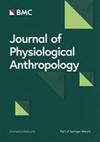FTO and MC4R polymorphisms, and selected pre-, peri- and postnatal factors as determinants of body mass index and fatness in children: a thorough analysis of the associations
IF 3.1
4区 医学
Q1 Social Sciences
引用次数: 0
Abstract
Overweight and obesity among children have become significant global health concerns. Previous studies have highlighted the potential role of genetic factors, particularly polymorphisms in the FTO and MC4R genes, as well as environmental factors in the development of childhood obesity. This study aimed to investigate the relationships between genetic, socioeconomic and perinatal factors, adverse childhood events (ACEs), and lifestyle, and their impact on overweight, obesity and body composition parameters in children. Additionally, we explored potential interactions between genetic factors and ACEs. Four hundred fifty-six children aged 6–12 years participated in our study. Information on the socioeconomic status, perinatal factors, ACEs and lifestyle of the children was collected with a questionnaire completed by their parents/guardians. We examined the children’s body weight and conducted an electrical bioimpedance analysis. Overweight and obesity were diagnosed based on the International Obesity Task Force and McCarthy criteria. We genotyped two selected polymorphisms in the FTO and MC4R genes using the TaqMan SNP allelic discrimination method. Higher BMI (Body Mass Index) z scores were related to higher paternal BMI and lower maternal age at the child’s birth. Higher FMI (Fat Mass Index) z scores were associated with higher paternal BMI, increased gestational weight, lower maternal education and the presence of the FTO risk allele. Higher FatM (fat mass in kg) z scores were linked to lower maternal education, lower maternal age at the child’s birth, higher maternal body weight gain, paternal BMI and the presence of the FTO risk allele. Moreover, interaction effects were observed on BMI z scores between ACE and FTO AA, and on FMI z scores and FatM z scored between ACE and MC4R CC. The contribution of environmental factors is more strongly related to changes in body composition than genetic ones. Additionally, the presence of the risk allele combined with unfavourable environmental factors like ACEs leads to visible interaction effects, resulting in increased BMI z scores and FMI z scores in children.FTO和MC4R多态性以及某些产前、围产期和产后因素是儿童体重指数和肥胖的决定因素:对相关性的全面分析
儿童超重和肥胖已成为全球关注的重大健康问题。以往的研究强调了遗传因素(尤其是 FTO 和 MC4R 基因的多态性)以及环境因素在儿童肥胖症发病中的潜在作用。本研究旨在调查遗传、社会经济和围产期因素、不良童年事件 (ACE) 和生活方式之间的关系,以及它们对儿童超重、肥胖和身体成分参数的影响。此外,我们还探讨了遗传因素与 ACE 之间可能存在的相互作用。456 名 6-12 岁的儿童参与了我们的研究。我们通过由家长/监护人填写的调查问卷收集了儿童的社会经济状况、围产期因素、ACE和生活方式等信息。我们检查了儿童的体重,并进行了生物电阻抗分析。超重和肥胖的诊断依据是国际肥胖问题工作组和麦卡锡标准。我们使用 TaqMan SNP 等位基因辨别法对 FTO 和 MC4R 基因中的两个选定多态性进行了基因分型。较高的 BMI(身体质量指数)Z 值与较高的父亲 BMI 和较低的母亲生育年龄有关。较高的 FMI(脂肪质量指数)z 评分与父亲较高的 BMI、妊娠体重增加、母亲受教育程度较低以及存在 FTO 风险等位基因有关。较高的 FatM(脂肪质量(公斤))z 评分与较低的母亲教育程度、较低的母亲生育年龄、较高的母亲体重增加、父亲体重指数和 FTO 风险等位基因的存在有关。此外,在 ACE 和 FTO AA 之间的 BMI z 分数上,以及在 ACE 和 MC4R CC 之间的 FMI z 分数和 FatM z 分数上,观察到了交互效应。与遗传因素相比,环境因素对身体成分变化的影响更大。此外,风险等位基因的存在与 ACE 等不利环境因素相结合,会产生明显的相互作用效应,导致儿童的 BMI z 分数和 FMI z 分数增加。
本文章由计算机程序翻译,如有差异,请以英文原文为准。
求助全文
约1分钟内获得全文
求助全文
来源期刊

Journal of Physiological Anthropology
Social Sciences-Human Factors and Ergonomics
CiteScore
4.80
自引率
6.50%
发文量
39
审稿时长
>12 weeks
期刊介绍:
Journal of Physiological Anthropology (JPA) is an open access, peer-reviewed journal that publishes research on the physiological functions of modern mankind, with an emphasis on the physical and bio-cultural effects on human adaptability to the current environment.
The objective of JPA is to evaluate physiological adaptations to modern living environments, and to publish research from different scientific fields concerned with environmental impact on human life.
Topic areas include, but are not limited to:
environmental physiology
bio-cultural environment
living environment
epigenetic adaptation
development and growth
age and sex differences
nutrition and morphology
physical fitness and health
Journal of Physiological Anthropology is the official journal of the Japan Society of Physiological Anthropology.
 求助内容:
求助内容: 应助结果提醒方式:
应助结果提醒方式:


